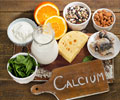The brain damage and dementia in elderly people may be because of calcium and vitamin D in dairy products
The brain damage and dementia in elderly people may be because of calcium and vitamin D in dairy products, suggests a new study presented at the Experimental Biology meeting in Washington DC.
Scientists from Duke University in Durham, North Carolina, said that too much calcium could cause neural damage by narrow blood vessels in the brain. They further said that the effect might be compounded by vitamin D, which regulates calcium retention and activity.The brains of 79 men and 153 women, aged between 60 to 86, were scanned during the study. All the participants had at least a number of brain lesions, areas of tissue damage, which varied in size and included tiny ones often seen even in healthy older people.
However, the likelihood of having a huge volume of brain lesions was higher in participants who consumed the most calcium and vitamin D. Age, high blood pressure, and other medical and mental conditions like depression did not make any difference to the results.
"At this point, we do not know if high calcium and vitamin D intake are involved with the causation of brain lesions, but the study provides support to the growing number of researchers who are concerned about the effects of too much calcium, particularly among older adults, given the current emphasis on promoting high intakes of calcium and vitamin D," the Independent quoted study leader Dr Martha Payne as saying.
She says that the next step in their research is to investigate possible ways in which high levels of calcium and vitamin D may damage the brain.
It is believed that when too much calcium is absorbed into blood vessel walls, it produces bone-like deposits, and this calcification may narrow the blood vessels and make them less flexible, reducing the blood flow through them.
Advertisement
Source-ANI
LIN/B











